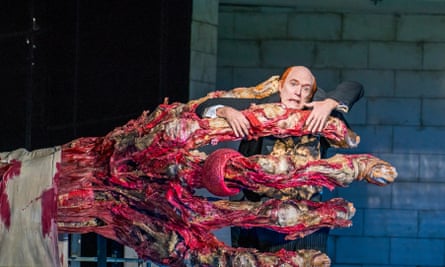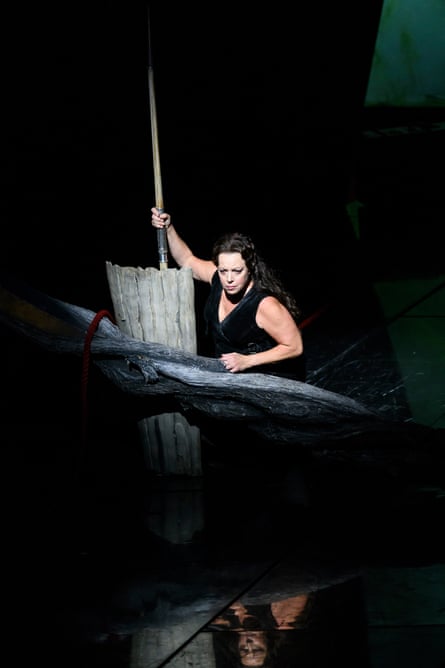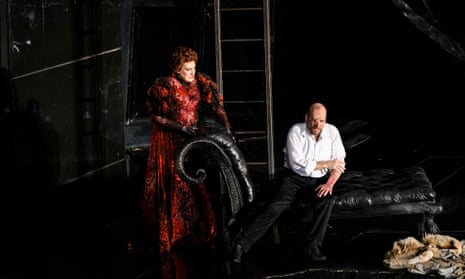Sailing up the Thames from Greenwich in 1877, a year after the Ring cycle had its premiere in Bayreuth, Wagner told his wife, Cosima: “This is Alberich’s dream come true – Nibelheim, world dominion, activity, work, everywhere the oppressive feeling of steam and fog.” It’s not a particularly flattering view of the capital. Alberich, the dwarf of German heroic legend, is the leader of the Nibelungen race. He renounces love and steals the all-powerful gold from the Rhinemaidens. His treacherous act sets in motion the Ring: four operas, 15 or so hours of music, and properly titled Der Ring des Nibelungen.
If London, and the UK, have changed since Wagner’s visit, they have also changed since 2012 when the Royal Opera last staged the Ring, and yet more radically since Keith Warner’s production was first seen, beginning in stages in 2004. It’s back in its entirety, reportedly for its last revival. Once again, ROH music director Antonio Pappano conducts. Never before has Wagner’s fantasy of gods, giants and dragons seemed more pertinent. Spitting-image parallels aren’t required. The single imperative, to disastrous end, is to get the gold, deal or no deal.
Warner’s obsession as a director is with line-by-line attention to detail. Singers must act for their lives, every nuance filling out their characters, even in those long passages when little seems to be happening. On the evidence of the first two operas, Das Rheingold and Die Walküre, this latest cast rises to the challenge to mesmerising effect. In the “preliminary evening”, as Wagner called Rheingold, Wotan (John Lundgren) and his dysfunctional god family inhabit a salon-cum-observatory, telescope directed at an unspecified dominion he may one day rule. The period is, loosely, Edwardian.
Johannes Martin Kränzle’s Alberich, contrary to type, towers over his subjects with reptilian zeal, far from the brutish figure he can sometimes be, yet convincing in his grubby, angry fanaticism. Gerhard Siegel, returning to the role of Mime, Alberich’s lank-haired, nerdy-nervy brother and sidekick, is as credible as Alan Oke’s Loge, quick-smiling demigod of fire, is supercilious, amoral and shrewd.

The young Norwegian soprano Lise Davidsen, in her house debut as Freia, lived up to her radiant, pure-voiced reputation. Warner and his designer, the late Stefanos Lazaridis, provide plenty of physical activity, with ladders and ropes and jokes too. Alberich’s disguise as a monster dragon, whose écorché limbs embrace the entire width of the stage, is amusingly gruesome.
In Die Walküre the staging initially felt chaotic. The tree root in Hunding’s house, always a problem in this production, remains an obstacle, blocking free movement (singers must climb over it like a stile). Symbolic objects – huge metal helix, hourglass, miniature aeroplane, red rope, spinning propeller – felt ornamental, though we know their meaning will become ever more apparent. If the first act didn’t quite coalesce (it will), Acts 2 and 3 fell into place as if by magic.

The orchestra was back on its mettle, Pappano drawing great arcs of sound while allowing each detail to speak. Of the many scorching moments, these stand out: the encounter between Stuart Skelton (Siegmund), making his ROH debut with bold, lyrical conviction, and Brünnhilde (Nina Stemme); the sexually charged marital argument between Wotan and Fricka (a wonderfully imperious, reasonable, furious Sarah Connolly); the terrified agitation of Sieglinde (Emily Magee) and the cold, handsome aggression of Hunding (Ain Anger). The Valkyries, stampeding madly on horses’ skulls, made beauty out of their shrieks and whoops.
As Wotan, John Lundgren had tired vocally at the end of Rheingold, but here revealed his strength, nuanced, expressive, angst-ridden, yet in command. In Stemme we are witnessing an exceptional Brünnhilde. They don’t come better. As the flames raced round the helix, throwing out alarming heat, she reclined – fortunately for her, on a comfortable leather sofa – to await the arrival of the hero Siegried. More next week. (Book now for the live cinema relay of Die Walküre on 28 October.)
Not all opera is deluxe. In the shabby-drab chic of Peckham’s Asylum chapel, Pop Up Opera staged La Tragédie de Carmen with four gifted young singers, a screen and a piano. Peter Brook’s pared-down 1981 version of Bizet’s opera sheds almost everything but the tunes. Directed by John Wilkie, the staging is minimal and highly physical. Chloe Latchmore makes a promisingly seductive Carmen, with Satriya Krisna (Don José), Alice Privett (Micaëla) and James Corrigan (Escamillo) characterful in support. Berrak Dyer, music director, commands all, prodigiously, from the piano. The tragic ending, which took place on the floor with only a leg visible from where I sat, was lost on me, but at least I know what happens. Support this enterprising outfit, essential to singers starting out. Coming soon to a village hall or barn near you: 22 venues between now and 23 November.
Star ratings (out of 5)
Das Rheingold/Die Walküre ★★★★
La Tragédie de Carmen ★★★
Das Rheingold and Die Walküre are in rep at the Royal Opera House, London, until 26/28 October

Comments (…)
Sign in or create your Guardian account to join the discussion